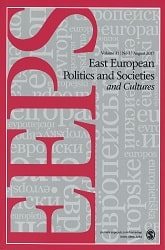Vulnerability and Economic Re-orientation: Rhetoric and in Reality in Hungary’s “Chinese Opening”
Vulnerability and Economic Re-orientation: Rhetoric and in Reality in Hungary’s “Chinese Opening”
Author(s): Wade Jacoby, Umut KorkutSubject(s): Governance, International relations/trade, Political economy, EU-Accession / EU-DEvelopment, Rhetoric
Published by: SAGE Publications Ltd
Keywords: Hungary; China; illiberal democracy; vulnerability; Fidesz;
Summary/Abstract: To what extent do Euroskeptic parties in Eastern and Central Europe have viable alternatives to the European Union and the broad basket of liberal policies promoted by the EU? In recent years, Hungarian Prime Minister Viktor Orbán has used his overwhelming parliamentary majorities to chart a partially new course, and this article inventories one aspect of this new course. The article asks whether Hungary can gain any potential benefits from closer links to China as a partial replacement for resources that might not be available (or that might be lost) from its more conventional European partners to the west. Orbán has often justified both radical constitutional change and economic nationalism as powerful medicines to push back against Hungary’s vulnerability at the hands of its foreign and domestic enemies. In this context, China emerged as both a potential source of new revenue and rhetorical trope that seemed to fit in a broader Fidesz discourse of an “Eastern opening.” This article makes a first attempt to separate rhetoric and reality. It first explores how the ongoing consolidation of illiberalism in Hungary has now also sparked a geopolitical repositioning through the “Eastern opening” during Fidesz’s second term. Second, it seeks to understand the theoretical proposition that new sources of external funding—including FDI and government bond purchases—can help enable a state to execute such a broad geopolitical shift. To do so, it develops empirical material from the fascinating Hungarian efforts to position themselves as a major beneficiary of Chinese engagement with Europe. The article concludes that Orbán’s policies have indeed been broadly consistent with his party’s new rhetoric, but it also concludes that the amount of Chinese investment is, in aggregate, still modest to date.
Journal: East European Politics and Societies
- Issue Year: 30/2016
- Issue No: 03
- Page Range: 496-518
- Page Count: 23
- Language: English
- Content File-PDF

